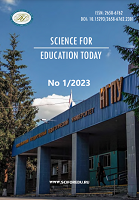Факторы, влияющие на мотивацию студентов неязыковых направлений очной и заочной форм обучения при онлайн- и офлайн-изучении иностранного языка
Factors determining the motivation of non-linguistic students in online and offline foreign language learning
Author(s): Yulia N. Mukhina, Sverlana S. KovalchukSubject(s): Foreign languages learning, School education, Educational Psychology, Sociology of Education
Published by: Новосибирский государственный педагогический университет
Keywords: Intrinsic motivation; Extrinsic motivation; Information and communication technology; Online learning; Offline learning; Foreign language learning;
Summary/Abstract: Introduction. The article investigates the specifics of traditional and distance learning for undergraduate and postgraduate non-linguistic students learning a foreign language. The authors focus on the types of motivation and the use of information and communication technologies (ICT) as an effective way to increase students' interest in learning a foreign language. The purpose of the article is to identify the factors influencing the motivation of full-time and part-time non-linguistic students in online and offline foreign language learning. Materials and Methods. The authors used theoretical (analysis, comparison) and empirical (observation, questionnaire, quasi-experiment) research methods to achieve the purpose and verify the hypotheses. The observed experimental groups of students answered a set of questions from a questionnaire in Microsoft Forms. The survey was divided into units devoted to the use of ICT for nonacademic purposes and for English language learning purposes, as well as a range of factors that may determine students' motivation. Results. The study revealed intrinsically and extrinsically motivated students in the experimental groups. The research findings showed that full-time undergraduate and postgraduate students found it more difficult to study online and their learning outcomes were significantly lower compared to parttime students. Nevertheless, the authors noted that part-time students preferred traditional foreign language learning. It was more difficult for them to concentrate on learning English at home than in the classroom. ICT in foreign language learning confirmed its effectiveness in acquiring and developing knowledge and communicative skills for full-time students due to durable application. Conclusions. The article concludes that different types of motivation are characteristic for parttime and full-time postgraduate and undergraduate students. Students’ motivation depends on a set of positive and negative factors affecting the learning process. Online learning is more effective for senior part-time students than for traditional part-time student population. The effectiveness of ICT is in direct correlation with the duration of use, so full-time students have a time advantage.
Journal: Science for Education Today
- Issue Year: 13/2023
- Issue No: 1
- Page Range: 28-46
- Page Count: 19
- Language: Russian

